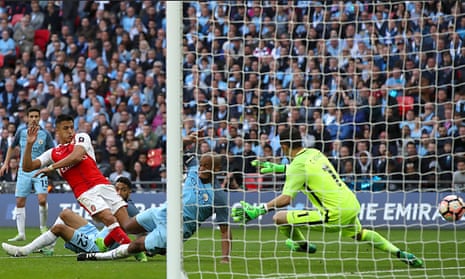You can’t always get what you want. But if you try sometimes – and you’re not too scarred by a complex, deadline-week, dual-jurisdiction triple-swoop involving both Raheem Sterling and Thomas Lemar – you might find you get what you need.
Manchester City might have been flying even higher at the top of the league and have scored more than their 35 goals had Alexis Sánchez signed from Arsenal in late August. Who knows, as the fixture list starts to bite, City’s fans may look on their brilliant but callow front line and think wistfully of Sánchez’s proven razor edge, his more seasoned warrior spirit.
But it does seem a fairly distant prospect right now. Indeed, as Arsenal and Sánchez travel to the Etihad to play the league leaders on Sunday afternoon, a journey Sánchez seemed so determined to make permanently in the summer, it is hard not to take a step back and marvel at the unforeseen consequences of one of the more complex botched big-money moves.
City were genuinely keen on signing Sánchez. The move fell apart as Pep Guardiola rejected the idea of letting Sterling go the other way. Revived on deadline day the whole thing collapsed for a second time as Arsenal’s own move for Lemar flatlined.
At the end of which we have, for now, a clear set of winners and losers. Undisrupted by big-name arrivals, and given their head by Sergio Agüero’s recent injury problems, City’s youthful Jesus-Sané-Sterling frontline has been allowed to settle into one of the most exciting things around in European club football right now.
Sterling’s improvement, in particular, is surely related in part to Guardiola’s heartening refusal to let him leave as a Sánchez makeweight. To date the oldest member of that attacking tripod – still aged only 22 – has 10 goals and two assists this season, reward for some driving forward runs and two years of hard work on both his finishing and final pass. Best of all he looks happy, a player starting to find his most effective gears.
At which point, enter Sánchez, who seems to have spent the past three months heading the other way; who has one goal in seven league games this season; and who has looked, so far, some way off his best self. City were said to be angry at the way Arsenal refused to sell Sánchez at the last. At it stands Sunday afternoon may just provide a little more evidence that perhaps this was a deal best left undone.
But then, even after eight seasons in Serie A, La Liga and the Premier League, Sánchez remains an intriguingly opaque A-list footballer.
In his early days at Barcelona he earned the nickname “Cachai?”, which translates as “know what I mean?”, a reference to the blank looks induced by his north Chilean brogue (Sánchez even ended up taking Spanish lessons for a while). There is still a sense of cachai about Sánchez now, an undeniably brilliant footballer who has still to find his definitive level, and who is clearly still bothered by his inconclusive spell at Barça.
Not that his best qualities are in doubt. In an Arsenal team defined in recent years by a sense of something a little too comfortable, Sánchez has been an invigorating tonic. Only Harry Kane, Romelu Lukaku and Agüero, all career No9s, have more goals in the Premier League in that time. Sánchez has been a wonderful signing. Right up until the moment he wanted to stop being one and play for City instead.
It is a move that would at least have addressed the wider question of whether some very distinct qualities really can work in a genuinely A-list team. In an interview last year Sánchez suggested it was only a wrong turn or two that had prevented him being hoist aloft on the Messi-Ronaldo pantheon.
Others might suggest there is a reason why his three years at Arsenal have been the most productive of his career, that it is only in a team where he can be the star that he has truly flourished: those streaky patches, the occasional wastefulness with the ball, the periods where he stops running, all excused by his own star status.
It would be unfair to suggest Sánchez’s time at Barcelona was a failure. He was injured a lot. He scored or made 81 goals in his 141 matches. But there is no doubt Sánchez has thrived with club and country as the kingpin rather than as a high-class ensemble player.
It was Udinese’s manager Francisco Guidolin who effectively discovered the Arsenal-issue Sánchez, moving him from wasteful wide attacker to a star No10 seven years ago and igniting his career in the process. Encouraged by Guidolin to play without fear and take risks Sánchez was voted most promising player in the world in a 2011 Fifa poll and was plucked out by Barcelona the same year.
At the end of which there is an element of the Peter principle about Sánchez’s status now. Are the gifts that make him so exceptional in a team where he can be the attacking star the same qualities that make him unsuitable in a team where possession is everything, where there are stars of equal or greater magnitude?
If there is a slight smear on his wonderful Arsenal record it is his poor recent scoring record against the best teams. He has one goal in his past 12 games against City, Chelsea, Manchester United, Liverpool and Tottenham.
At times Sánchez has seemed to rebel against this, a man playing his own, furious game within a game. During his summer sulk it was hard not to think back to an extraordinary 10-minute spell against Bayern Munich in the 5-1 defeat in Bavaria. That night Sánchez ran around the pitch in a mist of anger, scoring a goal, and burning himself out for the rest of the game: a footballer in a state of profound on-field tantrum, displaying simultaneously both his strengths and his weakness.
Given the youthful egalitarianism of City’s attack it is tempting to wonder exactly how he might have affected the balance of this team. Sunday afternoon would be an excellent moment to start answering that question, to offer Arsenal’s supporters a little sweetener after the summer; and to erase, at least until January, memories of another moment of uncomfortable inbetween.

